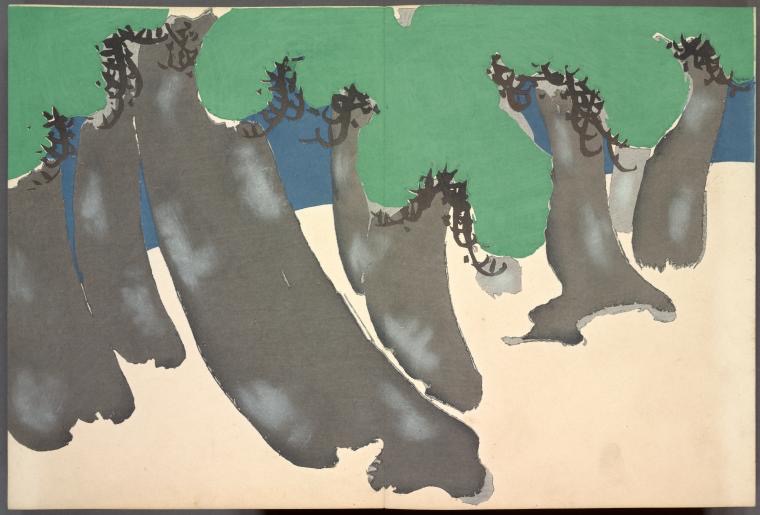Forested

Kamisaka Sekka (神坂 雪佳: Forest (1909-10)
“I couldn't imagine.”
Contrary to popular mythology, little of the North American continent seems Forested. Yes, more of it once was than now remains, but even then, the bulk of this place was initially comprised of empty spaces. Anyone expecting to encounter forest primeval here must adjust their expectations or face severe disappointment. While histories might speak of vast arboreal Forests covering the original Eastern seaboard, a few centuries and a blight or two later have reduced what once seemed infinite into the essentially invisible. Great fires eliminated the once-great Northwoods. Lumbering humbled the once impenetrable Cascade and Sierra. We've successfully put nature in her place as a servant to humanity's desires, not that those have ever called upon terribly much humanity from man. We see nature as our resource to do with whatever we please, with remarkably predictable results.
A toodle across western lands mostly traverses what might appear to be wasteland. Wasteland because it doesn't seem at all productive, and we classify land by its apparent return on our investment in it. Most of Nevada has become so valuable that it's reserved as bombing and missile range, preserved for blowing up. Considerable land has been allocated to unspecified secret military uses. This usually means that it will later be subjected to government-mandated cleanup efforts that are never expected to finish their mandates. Much of the remaining ground supports mining, the destruction and the removal of some precious metals to create more waste and wasteland. The occasional Cottonwood or Juniper tree might be all anyone sees of trees in the Great Basin Country. Whatever forests remain in national parks or terrain too rugged to traverse, let alone "develop."
Arizona seems beautiful in the way a painting might seem pretty. Up close, it's rough and gritty. Its trees do not always have leaves; if they do, they're incredibly tiny. Cactus or Juniper Trees might stand in for the usual inhabitants of Forests. Rocks and their formations serve as the primary focus of attention. The horizons feature endless-seeming lines of mountains absolutely devoid of vegetation, except when seen up close in certain seasons. In very early Spring, one might find green in some profusion, tiny and extremely close to the ground, and even wildflowers around, but not anything in the way of conventional Forests. Deserts have their own charms, which seem much different from those found in Forests. For those who crave moistness and shade. I counsel them to stay away from our Great Southwest. It will prove a great disappointment.
As a native Northwesterner, I always feel an alien when toodling around down here. Even West Of The Mountains, the once heavily forested ocean side of this country, two centuries of civilization has taken more than a mere toll. Its efforts might have built great cities, but they also resulted in endless shitty suburbs that seem more insult than blessing. Towns founded as lumber mills have been abandoned as the timber ran out, there having been little thought given to the inevitably finite nature of such gifts. Now, I find historical plaques reverently extolling the virtues of the pioneers who, as near as I can tell, extracted like Hell with little consideration of the consequences for their great-great grandchildren's children. We are their great-great grandchildren's children and seem to have learned nothing about what follows even the rightful pride of possession. While driving my own combustion engine across once trackless deserts, I was trying to imagine the ocean of petroleum—once Forests—this society depends upon. I couldn't imagine.
©2024 by David A. Schmaltz - all rights reserved


